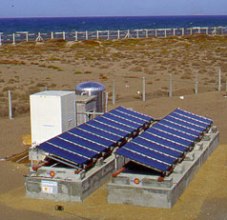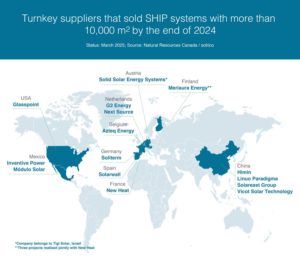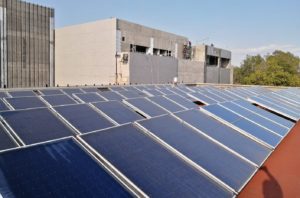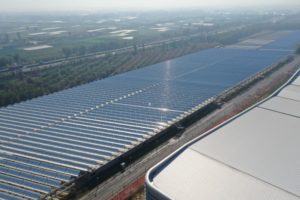India: Two Solar Desalination Pilot Projects by Tinox-Mage
August 28, 2010
MiniSal 1000
 One box on three Euro palettes brings the desalination unit to the site: The MiniSal 1000 purifies up to 1,000 litres of sea or brackish water per day like this installation in the town of Al-Hail in Oman. The first two pilot projects in India are already under way.
One box on three Euro palettes brings the desalination unit to the site: The MiniSal 1000 purifies up to 1,000 litres of sea or brackish water per day like this installation in the town of Al-Hail in Oman. The first two pilot projects in India are already under way.
Photo: Mage Water Management
One of the two pilot projects for solar thermal desalination in India with technology from the German company Tinox/Mage Water Management was set up in Chennai, Tamil Nadu. The so-called MiniSal 1000 has a daily capacity of 1,000 litres of purified drinking water and has just started operating in August. Its flat plate collectors were delivered by the German company Citrin Solar. The project was realised in cooperation with Mage Water Management’s Indian partner Gerindtec.
“This pilot project will be a demonstration unit for decision makers on the subcontinent and will most probably lead to further projects in the region,” Hendrik Müller-Holst, Technical Director of Mage Water Management, explains.
Mage uses a patented technology called Multi-Effect Humidification (MEH), which consists of two repeatedly applied work processes: In the first one, solar collectors deliver the energy to evaporate the sea or brackish water, which in turn will condense into purified water during the second process.
The advantage of the MEH technology according to a presentation held at the Intersolar North America in San Francisco in July: The process demands relatively low temperatures of around 80°C, which usual flat plate collectors are able to provide in a tropical country. The specific investment costs are also relatively low, with 15 EUR per litre and day. Consequently a unit producing 1,000 litres per day would cost EUR 15,000. Furthermore, it is not necessary to pre-treat the water chemically and the demand for maintenance is minimal.
The second pilot project by Mage Water Management will be realized at the Bhabha Atomic Research Centre (BARC) in Mumbai, in cooperation with the Indian developer Photon Energy Systems (PES), which is based in Hyderabad. The MiniSal 1000 plant there is thought to be operational within the next three months.
“Although the initial costs are high, the MEH technology will be less expensive than the mainly used reverse osmosis system by taking into account the long lifetime of 25 years and the low maintenance demand of the new demonstration plant,” Gautam Nalamada, Executive Director and CEO of PES, argues. BARC hopes for a successful implementation of the MiniSal, which would allow for the installation of several such units along the cost of India to help solve the drinking water problem.
This news is written in cooperation with Jaideep Malaviya, an expert in Solar Thermal in India. malaviya@solrico.com
More Information:
http://www.gerindtec.com
http://www.photonsolar.com
http://www.solar-desalination.com
http://www.mage-watermanagement.com
http://www.citrinsolar.de


